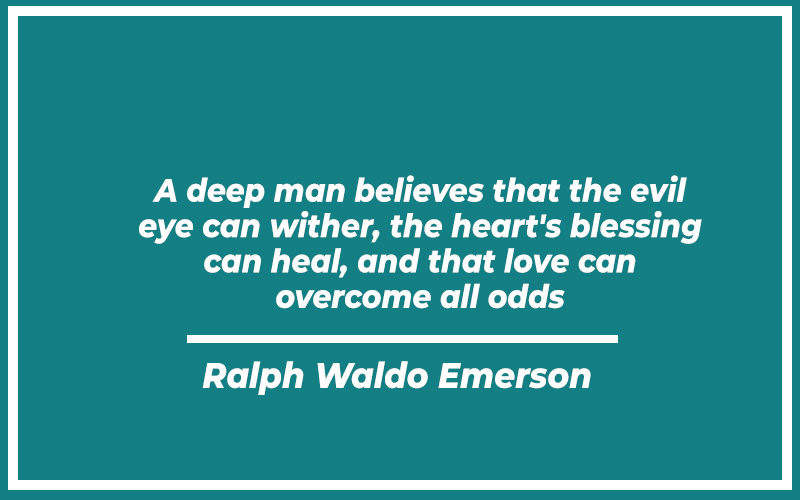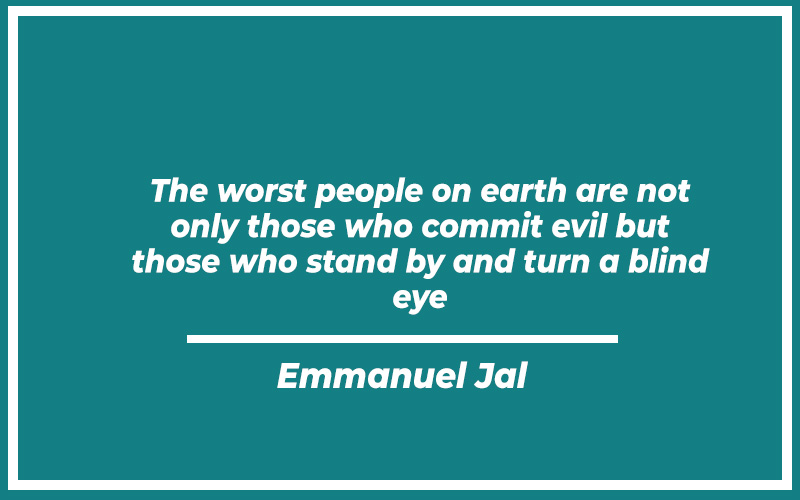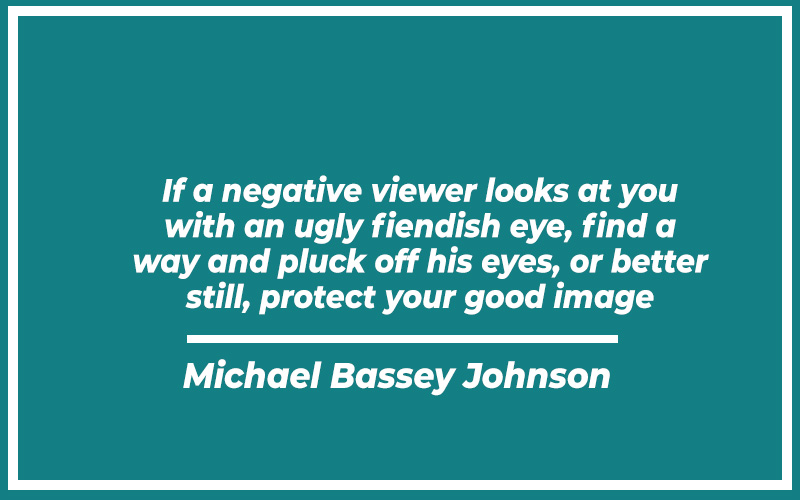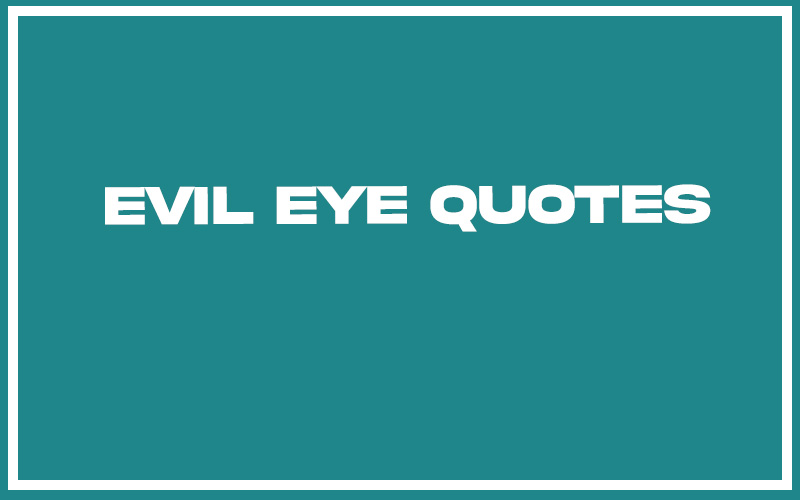The “evil eye” is an old belief that a jealous or mean look can cause you bad luck or harm. Quotes about the evil eye give you advice on how to protect yourself from these negative vibes.
They might offer blessings for safety, suggest keeping your life private, or share wise words on staying positive.
These quotes show how important it is to protect yourself from unseen negative influences and to find peace and safety in your life.
Best Evil Eye Quotes

“A deep man believes that the evil eye can wither, the heart’s blessing can heal, and that love can overcome all odds.” – Ralph Waldo Emerson
Ralph Waldo Emerson‘s quote explores the belief in the transformative power of goodness and love over malevolence, symbolized by the “evil eye.”
It suggests that an individual’s depth and character can protect them from negative influences, emphasizing the strength of positive emotions to counteract the harm that envy or ill-will might cause. Emerson’s view ties into the broader philosophical idea that inner virtue and resilience can shield one from external negativity.
Also read: Forbidden Love Quotes (with Explanation)
“Envy, my son, wears herself away and droops like a lamb under the influence of the evil eye.” – Jacopo Sannazaro
Jacopo Sannazaro poetically describes how envy diminishes the one who harbors it, likening it to a lamb weakened by the malign influence of the evil eye.
This quote highlights the self-destructive nature of envy, suggesting that it not only harms others but also degrades the person feeling envious, eroding their spirit as if under a curse. The imagery of a lamb—a symbol of innocence and purity—suffering under such a gaze, intensifies the tragic aspect of envy.
“The evil eye is the fascinum, it is that which has the effect of arresting movement and, literally, of killing life. At the moment the subject stops, suspending his gesture, he is mortified.” – Jacques Lacan
Jacques Lacan’s interpretation of the evil eye delves into its metaphorical power to petrify and destroy life, aligning it with the concept of ‘fascinum’—an enchantment that paralyzes.
His analysis reflects on how the evil eye can stifle vitality and initiative, causing a person to become stuck or ‘mortified,’ both in the sense of being horrified and in being rendered motionless. This presents the evil eye as not just a superstition, but a psychological phenomenon affecting behavior and perception.
“For all good and evil, whether in the body or in human nature, originates in the soul, and overflows from thence, as from the head into the eyes.” – Plato
Plato posits that the essence of good and evil stems from the soul, influencing our actions and visible through our eyes, which are often considered the windows to the soul.
This perspective underscores the belief that one’s inner morality or immorality can manifest outwardly, affecting how one is perceived by others. The idea here is that the evil or good one does can be visible in one’s gaze, reflective of the deeper moral state.
“I don’t believe in the evil eye. If your soul is sinless, no evil eye can harm you. Even a windstorm can fill dust in those houses whose windows are shaky.” – Sunanda Das
Sunanda Das offers a perspective of resilience against the evil eye, suggesting that spiritual purity renders one impervious to such curses. The analogy to a house with shaky windows implies that vulnerability lies in one’s own weaknesses.
Thus, a strong, virtuous individual need not fear the external malevolence symbolized by the evil eye, as their fortified character keeps them secure.
“The evil eye brings a man to his grave and a camel into the cauldron.” – Prophet Muhammad
This quote from Prophet Muhammad vividly highlights the destructive power attributed to the evil eye in many cultures, where it is believed to cause severe misfortune or even death.
The reference to both a man and a camel suggests that its effects can cross boundaries of human and animal, impacting all aspects of life. It serves as a cautionary note about the profound and often underestimated influence of negative thoughts and glances.
“Keep your eyes open. Guard your thoughts. Negativity lurks to divide you from one another, so your better natures become poisoned with hate. This is not who you are. This is not who you were destined to be. Keep your eye on unity. Keep your eye on encouragement. Keep your eyes on love then negativity will take its place as a powerless force. That is when you will fulfill the purpose you were born to achieve.” – Tom Krause
Tom Krause’s advice speaks to the importance of vigilance against the evil eye—interpreted here as the corrosive force of negativity that can infect communities and individuals.
He emphasizes the need to focus on unity, encouragement, and love, which can render negative forces impotent. His message is one of proactive positivity, guarding against the divisiveness that the evil eye represents, to fulfill one’s true potential.
“Evil is in the eye of the beholder.” – David Mitchell
David Mitchell’s observation ties the perception of evil to individual perspective, encapsulating the subjective nature of morality and judgement. His use of the phrase “in the eye of the beholder” suggests that what one person views as malevolent, another might see differently.
This quote reminds us that our personal biases and experiences shape our perceptions of right and wrong, making the concept of evil not universal but personal and variable.
“The only thing necessary for the triumph of evil is for good men to do nothing.” – Edmund Burke
Edmund Burke’s famous declaration serves as a call to action against passivity in the face of wrongdoing. He suggests that evil prevails when those who have the power to oppose it choose inaction instead.
This idea emphasizes the moral responsibility of individuals to act against injustices, highlighting that the absence of proactive goodness can be just as harmful as the presence of malevolence.
“Denounce useless guilt. Don’t make a cult of suffering. Live in the now, or at least the soon. Always do the things you fear most. Courage is an acquired taste like caviar. Trust all joy. If the evil eye fixes you in its gaze, look elsewhere. Get ready to be 87.” – Erica Jong
Erica Jong’s advice suggests a life lived boldly and without undue focus on negative energies, like those attributed to the evil eye.
By advising to look away from the evil eye and embrace joy and courage, Jong emphasizes resilience in the face of adversity. Her metaphor comparing courage to caviar implies that bravery, though initially daunting, can become enjoyable and fulfilling.
“If we live according to the law an eye for an eye, we will never escape from the spiral of evil.” – Pope Francis
Pope Francis warns against the perpetuation of violence and retribution, often symbolized by the principle of “an eye for an eye.”
He suggests that adhering to such a law only continues a cycle of retaliation that breeds further evil. His perspective advocates for forgiveness and the breaking of cycles of violence as a means to achieve true peace and moral progress.
“Jesus knew that the old eye-for-eye philosophy would leave everyone blind. He did not seek to overcome evil with evil. He overcame evil with good. Although crucified by hate, he responded with aggressive love.” – Martin Luther King, Jr.
Martin Luther King, Jr. reflects on Jesus Christ’s teachings, emphasizing the transformative power of love over the destructive cycle of retribution.
He highlights that combating hate with hate only leads to more suffering, whereas responding with love has the power to break cycles of violence and lead to healing and reconciliation. King’s commentary reinforces the philosophy that love is a stronger force against evil than vengeance.

“The worst people on earth are not only those who commit evil but those who stand by and turn a blind eye.” – Emmanuel Jal
Emmanuel Jal criticizes not just the perpetrators of evil acts, but also those who passively allow them to happen.
His quote emphasizes the moral culpability of inaction, suggesting that indifference or failure to intervene can be just as harmful as the act of committing evil itself. Jal’s statement is a reminder of the collective responsibility to oppose wrongdoing actively.
“What is reprehensible is that while leading good lives themselves and abhorring those of wicked men, some, fearing to offend, shut their eyes to evil deeds instead of condemning them and pointing out their malice.” – Saint Augustine of Hippo
Saint Augustine addresses the hypocrisy of those who live morally upright lives yet remain silent in the face of evil.
He critiques the fear of confrontation that leads to passivity, advocating for the necessity of speaking out against injustice even when it is uncomfortable. His perspective underlines the duty of the morally conscious to not only abstain from evil but to actively combat it.
“The evil eye is real and should not be taken lightly. Most people are negligent in protecting themselves and do not worry about showing off their blessings, posting every detail of their life on social media. Know that not everyone who sees your story will be happy for you!” – Firdaus Shaz
Firdaus Shaz warns against the dangers of flaunting one’s successes and blessings, particularly in the age of social media, where the evil eye can manifest through jealousy and malice from onlookers.
This quote emphasizes the need for prudence and privacy, suggesting that not everyone who follows your life wishes you well. The advice serves as a caution to guard against the negative energies that envy can generate.
“Trade protection accumulates upon a single point the good it affects, while the evil inflicted is infused throughout the mass. The one strikes the eye at first glance, while the other becomes perceptible only to close investigation.” – Frederic Bastiat
Frederic Bastiat’s quote delves into the complex consequences of protectionist policies, metaphorically related to the concept of the evil eye.
He suggests that while such policies may offer immediate visible benefits, they often spread more subtle and pervasive harm throughout the economy. Bastiat highlights the importance of looking beyond the surface to understand the deeper and broader impacts of economic decisions.
“If a negative viewer looks at you with an ugly fiendish eye, find a way and pluck off his eyes, or better still, protect your good image.” – Michael Bassey Johnson
Michael Bassey Johnson confronts the challenge of dealing with malicious scrutiny or judgment from others. He metaphorically advises protecting oneself against the harmful intentions encapsulated by the “evil eye” by either confronting the negativity or safeguarding one’s reputation.
This quote underscores the importance of maintaining personal integrity and image in the face of adversity.
“I always wear my evil eye necklace to ward off bad karma. I always wear one to protect me.” – Gracie Gold
Gracie Gold discusses her personal practice of wearing an evil eye necklace as a protective talisman against negative forces or bad karma. This reflects a common cultural practice where symbols like the evil eye are used as spiritual safeguards.
Her belief in the protective power of such amulets highlights a personal approach to managing unseen threats and maintaining spiritual well-being.
“A man who knows a thing, who is aware of a given danger, and sees the possibility of a remedy with his own eyes, has the duty and obligation by God not to work ‘silently,’ but to stand up before the whole public against the evil and for its cure.” – Adolf Hitler
This quote, attributed controversially to Adolf Hitler, emphasizes the responsibility of those who are aware of evil to take action against it, rather than remaining silent.
It asserts that knowledge of wrongdoing imposes a moral obligation to confront and address the issue publicly, advocating for active opposition rather than passive acceptance. This perspective demands a proactive stance in combating malevolence.
“Sometimes, you block your own blessings by telling everyone your own business.” – Anonymous
This quote highlights the potential self-sabotage that can occur when individuals share too much about their lives with others.
The idea suggests that discussing personal successes or plans openly can invite negative energies or the evil eye, which may hinder one’s progress or blessings. It serves as a cautionary reminder of the value of privacy and discretion in personal affairs.
“The ‘Nazar,’ more commonly known as the ‘evil eye,’ is over 5000 years old. It is found in all major religions and throughout countless cultures. It is believed that the eye protects its owner from evil spirits, jealousy, and the ‘ill will’ of others, by peering back at them in their spiritual realm.” – Anonymous
This commentary explores the historical and cultural significance of the ‘Nazar’ or ‘evil eye’ talisman. It emphasizes the widespread belief in its protective powers against malevolence and envy.
The quote illuminates the universal nature of this symbol, transcending various religions and cultures, and highlights its role as a protective barrier against the negative forces directed at individuals.
“May no evil eye peek through window, keyhole, or gunsight at his white-haired face!” – Allen Ginsberg
Allen Ginsberg uses vivid imagery to express a protective wish against the evil eye, invoking a scene where one is shielded from harmful gazes through everyday openings.
This plea highlights the desire to protect the vulnerable, particularly the elderly, from malevolent forces that might intrude into private spaces, symbolically through windows or keyholes.
“Night is a stealthy, evil raven wrapt to the eyes in his black wings.” – Thomas Bailey Aldrich
Thomas Bailey Aldrich personifies night as a raven, enveloping everything within its dark, ominous wings, akin to the evil eye.
This metaphor illustrates the enveloping nature of darkness, suggesting a malevolent influence that obscures and threatens, similar to the pervasive fear of malignant forces in folklore.
“May every evil eye in your life go blind.” – Anonymous
This anonymous blessing invokes a powerful counter to the evil eye—wishing that any malevolent gaze turned against one loses its power.
It embodies the protective charm people seek against negativity and ill-will, emphasizing a return to peace and safety from harmful intentions.
“Most people who perpetrate evil do not see what they are doing as evil. Evil exists primarily in the eye of the beholder, especially in the eye of the victim.” – Roy F. Baumeister
Roy F. Baumeister reflects on the subjective nature of evil, suggesting that perpetrators often do not recognize their actions as evil, which is more vividly perceived by their victims.
This statement explores the psychological and moral complexities of human actions, emphasizing the differing perceptions between those who commit acts and those who suffer from them.
“The part of the philanthropist is indeed a dangerous one, and the man who would do his neighbor good must first study how not to do him evil and must begin by pulling the beam out of his own eye.” – George MacDonald
George MacDonald highlights the moral responsibilities of those who wish to help others, stressing the importance of self-reflection and the need to avoid causing unintended harm.
This quote serves as a caution to those with good intentions, reminding them to ensure their actions do not have negative consequences.
“Always tiptoe. I don’t want them to hear you. I need to keep you in a bubble. I don’t want them to hurt you. I fear the evil eye. I need to protect you from it.” – Juveria Fatima
Juveria Fatima expresses an intense protective instinct, reflecting a deep fear of the evil eye’s influence.
This quote reveals the lengths to which one might go to safeguard loved ones from perceived spiritual threats, encapsulating a vigilant, almost secretive approach to protection.

“If a negative viewer looks at you with an ugly fiendish eye, find a way and pluck off his eyes, or better still, protect your good image.” – Michael Bassey Johnson
Michael Bassey Johnson offers advice on confronting or avoiding the malevolent gaze of others, suggesting assertive measures to protect one’s reputation and well-being against harmful scrutiny.
This quote underscores the importance of maintaining personal integrity and safeguarding oneself from the negative perceptions of others.
Also read: Funny Saturday Quotes (with Explanation)
Final Thoughts
In summary, quotes about the evil eye give you helpful tips on how to protect yourself from negativity and bad luck caused by jealous or mean looks.
They remind you to be careful, keep some things private, and stay positive. These quotes help you understand and guard against unseen negative influences, ensuring you stay safe and at peace.

